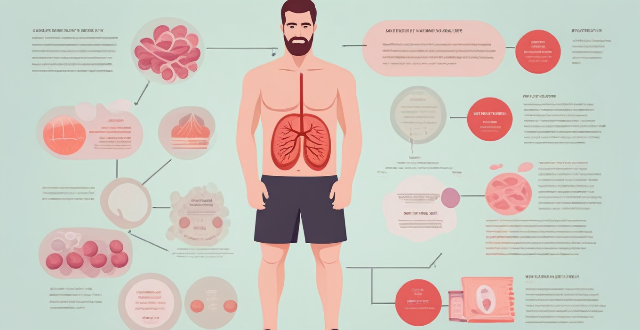Exercise Blood

Can aerobic exercise improve my cardiovascular health ?
Aerobic exercise is essential for maintaining and improving cardiovascular health, offering benefits such as strengthened heart muscle, lowered blood pressure, increased HDL cholesterol, reduced inflammation, weight management, improved circulation, and better blood sugar regulation. Regular aerobic activities like walking, jogging, cycling, swimming, or group fitness classes can significantly enhance overall heart health. The American Heart Association recommends at least 150 minutes of moderate-intensity aerobic exercise weekly, spread throughout the week, to achieve these benefits.

Can exercise reverse heart disease ?
Heart disease is a major cause of death worldwide, and it can be devastating to those affected. While there are many treatments available for heart disease, including medication and surgery, some people wonder if exercise can reverse the damage caused by heart disease. There is evidence that regular exercise can help prevent and manage heart disease by improving cardiovascular health, managing weight, lowering blood pressure, improving cholesterol levels, and reducing stress. However, there is no conclusive evidence that exercise can completely reverse heart disease. Despite this, there are still many benefits to regular exercise for heart health. If you have been diagnosed with heart disease or are at high risk for developing it, talk to your doctor about starting an exercise program. They can help you create an exercise plan that is safe and effective for your individual needs and goals.

How does exercise affect brain function and cognitive abilities ?
This article discusses how regular physical activity positively impacts brain function and cognitive abilities by improving blood flow, boosting neurotrophic factors, enhancing plasticity, and reducing inflammation. It emphasizes the importance of incorporating exercise into one's lifestyle for maintaining and enhancing cognitive health.

Can exercise reverse or slow the progression of existing chronic diseases ?
**Can Exercise Reverse or Slow the Progression of Existing Chronic Diseases?** Chronic diseases like diabetes, heart disease, and cancer often require lifelong management. Many wonder if exercise can play a role in mitigating these conditions. This discussion explores the potential benefits of physical activity for those with chronic illnesses. **Benefits of Exercise for Chronic Diseases:** - **Cardiovascular Disease**: Improved blood pressure, reduced risk of heart attack, enhanced lipid profile. - **Diabetes**: Better blood sugar control, aid in weight management, reduced complications. - **Cancer**: Improved quality of life, reduced fatigue, potentially better survival rates. **How Exercise Contributes to These Benefits:** - Increased blood flow ensures better organ oxygenation and nutrient delivery. - Anti-inflammatory effects alleviate symptoms of chronic diseases. - Boosted immune function helps fight infections and potentially cancer cells. **Implementing an Exercise Program:** - **Consultation**: Always consult your healthcare provider before starting. - **Gradual Progression**: Start slowly and build up over time. - **Balanced Routine**: Include cardio, strength training, and flexibility exercises. - **Monitoring Response**: Track how your body responds to different exercises. **Conclusion:** While exercise might not reverse chronic diseases outright, it significantly slows their progression and enhances well-being. Tailoring an exercise program under medical guidance allows those with chronic conditions to actively manage their health, improving their quality of life.

Can exercise physiology be used to treat chronic diseases like diabetes and hypertension ?
Exercise physiology can be effectively used to treat chronic diseases like diabetes and hypertension by improving blood sugar control, aiding in weight management, reducing blood pressure, and enhancing cardiovascular health. Individualized exercise programs, education on lifestyle modifications, and consistent support from professionals contribute to better disease management and overall well-being.

Can exercise be used as a treatment for chronic diseases like diabetes or hypertension ?
Exercise can be used as a treatment for chronic diseases like diabetes and hypertension by improving insulin sensitivity, promoting weight loss, reducing cardiovascular risk, and providing stress relief. Recommended exercises include aerobic activities, resistance training, yoga, and tai chi. It is important to consult with a healthcare professional before starting an exercise program.

How does exercise improve cardiovascular health ?
This essay explores the ways in which exercise can improve cardiovascular health. It explains how regular physical activity strengthens the heart muscle, increases blood flow, and lowers blood pressure. The essay also discusses how exercise can reduce risk factors for cardiovascular disease, such as obesity, diabetes, and high cholesterol levels. Additionally, it highlights the positive effects of exercise on mental health and well-being, including stress reduction, depression management, and improved quality of life. Overall, the essay emphasizes the importance of regular exercise for a healthy lifestyle and encourages readers to incorporate physical activity into their daily routines.

How does exercise impact memory and learning ?
Exercise has a positive impact on memory and learning by increasing blood flow, releasing neurotrophic factors, reducing inflammation, alleviating stress, and improving sleep quality. Incorporating physical activity into daily routine can enhance cognitive functions.

How does exercise improve cognitive function ?
Exercise plays a crucial role in enhancing cognitive function, including memory, attention, and problem-solving skills. It promotes brain plasticity, increases blood flow and oxygenation, reduces inflammation, and improves sleep quality. Incorporating exercise into your routine can be done through various activities such as running, swimming, or yoga. Start small and gradually increase intensity and duration, find enjoyable activities, incorporate mindful movement, make it social, set realistic goals, and consult with a professional if needed.

How does exercise influence neuroplasticity and cognitive function ?
Exercise has a positive impact on neuroplasticity and cognitive function by increasing blood flow, releasing growth factors, reducing inflammation, improving attention and concentration, enhancing memory, and slowing cognitive decline. Incorporating regular physical activity into your lifestyle can have numerous benefits for your brain health and overall well-being.

How does exercise impact glucose metabolism and insulin sensitivity ?
Exercise is crucial for maintaining healthy glucose metabolism and insulin sensitivity. It lowers blood sugar levels by increasing glucose utilization in muscles, stimulates new glucose production through gluconeogenesis, and improves insulin sensitivity by reducing inflammation and oxidative stress. Regular exercise can help prevent or manage diabetes by improving blood sugar control, reducing the risk of complications, and promoting overall health and well-being. However, people with diabetes should consult their healthcare provider before starting an exercise program to ensure safety and effectiveness.

What are the benefits of aerobic exercise ?
Aerobic exercise, also known as "cardio," is a form of physical activity that increases your heart and breathing rate. It's any activity that keeps large muscles moving in a rhythmic manner for an extended period of time. Some examples include brisk walking, jogging, swimming, cycling, and dancing. The key benefits of aerobic exercise include improved heart health, weight management, boosted immune system, improved lung function, reduced stress, improved sleep, boosted mood, increased brain volume, slowed age-related cognitive decline, improved stamina, enhanced bone health, and promoted longevity. Incorporating aerobic exercise into your lifestyle can greatly improve your quality of life.

How does exercise contribute to mental rejuvenation ?
Exercise plays a crucial role in mental rejuvenation by releasing endorphins, improving blood flow, enhancing neuroplasticity, reducing stress, improving sleep quality, facilitating social interaction, and boosting self-esteem. Regular physical activity can significantly contribute to improved cognitive functions, emotional stability, and overall mental well-being.

Can exercise reduce the risk of developing cardiovascular diseases ?
Cardiovascular diseases (CVDs) are a leading cause of death worldwide, and regular physical activity or exercise is one of the most effective ways to reduce the risk of developing them. Exercise helps improve blood circulation, lower cholesterol levels, reduce inflammation, manage weight, and improve glucose control. The American Heart Association recommends at least 150 minutes per week of moderate-intensity aerobic activity or 75 minutes per week of vigorous-intensity aerobic activity, along with muscle-strengthening activities at least two days per week.

Can regular exercise prevent cognitive decline in older adults ?
Regular exercise may help prevent cognitive decline in older adults by promoting neuroplasticity, improving blood flow to the brain, and reducing inflammation. Multiple studies have found positive associations between physical activity and cognitive function in this age group. Guidelines recommend aerobic exercise, resistance training, and activities that improve flexibility and balance. Making exercise a regular part of daily life is key for maintaining cognitive benefits over time.

How does regular exercise contribute to the prevention of chronic diseases ?
Regular exercise is essential for preventing chronic diseases by improving cardiovascular health, managing weight, and promoting mental health benefits. It strengthens the heart, lowers blood pressure, reduces cholesterol levels, burns calories, increases metabolism, improves insulin sensitivity, reduces stress and anxiety symptoms, improves sleep quality, and reduces depression symptoms. Incorporating regular exercise into your daily routine can provide long-term health benefits beyond physical fitness alone.

Why is it important to warm up before exercise ?
Warming up before exercise is crucial for preparing the body, preventing injuries, and improving performance. Benefits include increased blood flow, raised body temperature, loosened joints, prepared nervous system, reduced cardiovascular risk, and enhanced workout results.

What role does physical exercise play in boosting mental focus ?
Physical exercise is not only beneficial for our physical health, but it also plays a crucial role in enhancing mental focus. Here's how: 1. Release of Endorphins: Regular exercise triggers the release of endorphins, which can help reduce stress and anxiety, leading to improved mental clarity and focus. 2. Increased Blood Flow to the Brain: Engaging in physical activities increases blood flow to the brain, delivering more oxygen and nutrients. This increased blood flow can help improve cognitive function, memory, and overall mental sharpness. 3. Better Sleep Quality: Exercise has been shown to promote better sleep quality and duration. Adequate sleep is essential for maintaining mental focus and concentration throughout the day. 4. Reduction of Stress and Anxiety: Physical activity helps lower levels of the body's stress hormones, such as cortisol. By reducing stress and anxiety, exercise allows individuals to maintain a clearer mind and stay focused on tasks at hand. 5. Enhanced Self-Confidence and Mood: Regular exercise can boost self-esteem and confidence, leading to a positive outlook on life. A positive mindset contributes to better mental focus and productivity. 6. Improved Cognitive Function: Studies have found that regular physical exercise can lead to improvements in various aspects of cognitive function, including attention, memory, and executive functions. These cognitive enhancements directly contribute to increased mental focus and concentration.

How does dehydration during exercise affect performance and physiological responses ?
Dehydration during exercise can significantly impact performance and physiological responses. It decreases blood volume, impairs thermoregulation, affects cognitive function, increases heart rate and blood pressure, causes respiratory alkalosis, leads to muscle cramping and stiffness, and alters metabolic processes. Athletes should stay hydrated to avoid these negative effects.

How does regular exercise contribute to boosting the immune system ?
Regular exercise has numerous health benefits, including boosting the immune system. It promotes increased blood circulation, reduces inflammation, helps in weight management, reduces stress, improves sleep quality, enhances gut health, increases antioxidant capacity, supports cardiovascular health, enhances mental health, and contributes to increased longevity. Incorporating regular physical activity into your lifestyle can support a strong and resilient immune system.

How does exercise impact the prevention and management of type 2 diabetes ?
Exercise is important to prevent and manage type 2 diabetes. It improves insulin sensitivity, reduces blood sugar levels, and promotes weight loss. Regular physical activity can help prevent type 2 diabetes by improving the body's ability to use glucose for energy and reducing visceral fat. To prevent type 2 diabetes, adults should aim for at least 150 minutes of moderate-intensity aerobic exercise per week or 75 minutes of vigorous-intensity aerobic exercise per week. For managing type 2 diabetes, it is recommended that people engage in at least 150 minutes of moderate-intensity aerobic exercise per week or 75 minutes of vigorous-intensity aerobic exercise per week. Strength training exercises should also be included at least twice per week.

Can diet and exercise affect memory according to scientific studies ?
Diet and exercise can positively impact memory, asDiet and exercise can positively impact memory, as a healthy lifestyle that promote cognitive while regular physical activity increases blood flow to the brain, reduces inflammation, and promotes the growth of new neurons. Conversely, a poor diet lacking in essential nutrients and lack of exercise can have negative effects on memory over time. Therefore, adopting a healthy lifestyle that includes a balanced diet and regular exercise is essential for maintaining good memory and overall brain health.

What role does exercise play in maintaining cognitive function in old age ?
Exercise is crucial for maintaining cognitive function in old age, with benefits including improved blood flow, reduced inflammation, and increased neuroplasticity. Aerobic exercise, resistance training, and activities like yoga and tai chi are all beneficial. Incorporating physical activity into your daily routine can help keep your mind sharp as you age.